Introduction
STU, S3 Terminal UI, is a interactive terminal-based explorer for Amazon S3 (AWS S3).
With STU, you can browse buckets and objects directly from your terminal, preview files, and download them with ease.

Key Features
- Recursive object downloads
- Previews with syntax highlighting for text files and inline rendering for images
- Access to previous object versions
- Customizable key bindings
- Support for S3-compatible storage
Built with Rust and ratatui.
STU is available on GitHub under the MIT license.
Getting Started
Installation
Cargo
cargo install --locked stu
Homebrew
brew install stu
or from tap:
brew install lusingander/tap/stu
AUR
paru -S stu
Binary
You can download binaries from GitHub Releases.
Build from source
If you want to check the latest development version, build from source:
git clone https://github.com/lusingander/stu.git
cd stu
cargo build --release
Basic Usage
After Installation, run the following command:
stu
Basically, you can use it in the same way as the AWS CLI.
In other words, if the default profile settings exist or the environment variables are set, you do not need to specify any options.
If you want to specify it using command line options, see Command Line Options.
Command Line Options
-r, --region <REGION>
Specify the AWS region.
stu --region ap-northeast-1
-e, --endpoint-url <URL>
Specifies the AWS endpoint.
Use this if you are connecting to an S3-compatible service such as localstack, minio, or other external storage services.
stu --endpoint-url http://localhost:4566
-p, --profile <NAME>
Specifies the AWS profile name.
stu --profile foo
-b, --bucket <NAME>
Specify the bucket name.
This will not open the bucket list, but will open the object list directly. This is useful if you are only interested in or have permissions to a specific bucket.
stu --bucket bar-bucket
-P, --prefix <PREFIX>
Specifies an object prefix.
This will open only objects under the specified prefix.
This option must be specified together with the --bucket option.
stu --bucket bar-bucket --prefix path/to/object/
--path-style <TYPE>
Specifies the address model for accessing S3-compatible services.
Possible values: auto, always, never
neveruses Virtual-Hosted Style, which is what AWS currently uses.https://bucket.s3.region.amazonaws.com/key
alwaysuses Path Style, which is used when using localstack, minio, etc.https://s3.region.amazonaws.com/bucket/key
autoautomatically determines which model to use, which is the default setting.
For other S3-compatible services, which one to use depends on the service.
stu --path-style auto
--no-sign-request
Disable request signing.
Credentials will not be loaded if this argument is provided. This option is useful when accessing public buckets that do not require authentication.
stu --no-sign-request
--debug
Enable debug logging.
Currently, the debug log only includes application-level events and logs from the AWS SDK.
-h, --help
Displays a help message.
-V, --version
Displays the version.
Configurations
You can use config.toml to configure various aspects of your application.
Config is loaded from $STU_ROOT_DIR/config.toml.
- If
STU_ROOT_DIRenvironment variable is not set,~/.stuis used by default.- If the
STU_ROOT_DIRdirectory does not exist, it will be created automatically.
- If the
- If the config file does not exist, the default values will be used for all items.
- If the config file exists but some items are not set, the default values will be used for those unset items.
STU_ROOT_DIR
$STU_ROOT_DIR will be structured as follows:
$STU_ROOT_DIR
│
├── config.toml
│
├── keybindings.toml
│
├── error.log
│
├── debug.log
│
├── preview_theme/
│ ├── material-theme-dark.tmTheme
│ └── ...
│
└── preview_syntax/
├── toml.sublime-syntax
└── ...
Config File Format
Example
download_dir = "$STU_ROOT_DIR/download"
max_concurrent_requests = 5
default_region = "us-east-1"
[ui.bucket_list]
default_sort = "default"
[ui.object_list]
date_format = "%Y-%m-%d %H:%M:%S"
date_width = 19
default_sort = "default"
[ui.object_detail]
date_format = "%Y-%m-%d %H:%M:%S"
[ui.help]
max_help_width = 100
[preview]
highlight = false
highlight_theme = "base16-ocean.dark"
image = false
encodings = [
"utf-8",
"utf-16be",
"utf-16le",
]
auto_detect_encoding = false
Configuration Options
download_dir
The directory to save the downloaded objects.
- type:
string - default:
$STU_ROOT_DIR/download
$STU_ROOT_DIR will be the actual expanded value.
max_concurrent_requests
The maximum number of concurrent requests when recursive downloading objects.
- type:
usize - default:
5
default_region
The default region to use if the region cannot be obtained from the command line options or AWS settings.
- type:
string - default:
us-east-1
ui.bucket_list.default_sort
The default sort order of the bucket list.
- type:
string - default:
default - possible values:
defaultname_ascname_desc
ui.object_list.date_format
The date format of a last modified in the object list. The format must be specified in strftime format.
- type:
string - default:
%Y-%m-%d %H:%M:%S
ui.object_list.date_width
The width of a last modified in the object list.
It is recommended to set this when setting date_format.
- type:
u16 - default:
19
ui.object_list.default_sort
The default sort order of the object list.
- type:
string - default:
default - possible values:
defaultname_ascname_descdate_ascdate_descsize_ascsize_desc
ui.object_detail.date_format
The date format of a last modified in the object detail. The format must be specified in strftime format.
- type:
string - default:
%Y-%m-%d %H:%M:%S
ui.help.max_help_width
The maximum width of the keybindings display area in the help.
- type:
usize - default:
100
preview.highlight
Whether syntax highlighting is enabled in the object preview.
- type:
bool - default:
false
See Syntax Highlighting for details on possible values.
preview.highlight_theme
The name of the color theme to use for syntax highlighting in the object preview.
- type:
string - default:
base16-ocean.dark
See Color Themes for details on possible values.
preview.image
Whether image file preview is enabled in the object preview.
- type:
bool - default:
false
preview.encodings
Array of labels for the encoding want to use. Label names should be specified from https://encoding.spec.whatwg.org/#names-and-labels.
- type:
array of strings - default:
["utf-8", "utf-16be", "utf-16le"]
preview.auto_detect_encoding
Whether to enable encoding auto detection.
- type:
bool - default:
false
Syntax Highlighting
In the object preview, Syntax highlighting using syntect is available.
To enable this, set preview.highlight = true in the config file.
Color Themes
You can change the color theme by specifying the theme name in preview.highlight_theme.
By default the following themes are available:
base16-ocean.darkbase16-eighties.darkbase16-mocha.darkbase16-ocean.lightInspiredGitHubSolarized (dark)Solarized (light)
Also, by creating xxx.tmTheme in $STU_ROOT_DIR/preview_theme/, you can use xxx and load it.
Syntax definitions
You can add syntax definitions for file types that are not supported by default.
You can use it by creating a .sublime-syntax file in $STU_ROOT_DIR/preview_syntax/.
https://www.sublimetext.com/docs/syntax.html
Keybindings
The default basic key bindings are as follows:
| Key | Description |
|---|---|
| Ctrl-C | Quit app |
| Enter | Confirm / Open selected item |
| Backspace | Go back to previous |
| j/k | Select item / Scroll |
| ? | Show help |
Detailed operations on each view can be displayed by pressing ? key.
Custom Keybindings
You can set your own custom key bindings.
Custom bindings are loaded from $STU_ROOT_DIR/keybindings.toml.
The default key bindings are defined in ./assets/keybindings.toml. You can set key bindings for each screen action in the same format.
- It is possible to set multiple key bindings for one action.
- If you do not set key bindings for an action, the default key bindings will be assigned.
- You can disable an action by setting
[]as the key bindings.
Key Formats
You can use the following formats to define key bindings.
Modifier Keys
ctrl-alt-shift-
Modifiers can be combined, for example: ctrl-shift-a.
Special Keys
| Key | Description |
|---|---|
esc | Escape |
enter | Enter |
left | Left arrow |
right | Right arrow |
up | Up arrow |
down | Down arrow |
home | Home |
end | End |
pageup | Page Up |
pagedown | Page Down |
backtab | Back Tab (Shift + Tab) |
backspace | Backspace |
delete | Delete |
insert | Insert |
f1 - f12 | Function keys |
space | Space |
hyphen, minus | Hyphen (-) |
tab | Tab |
Character Keys
Any single character not listed above (e.g., a, b, 1, !) can be used as a key.
Example
If you want to change the key bindings for moving up and down from k/j to up/down, you can set the following in $STU_ROOT_DIR/keybindings.toml.
[bucket_list]
down = ["down"]
up = ["up"]
[object_list]
down = ["down"]
up = ["up"]
[object_detail]
down = ["down"]
up = ["up"]
[object_preview]
down = ["down"]
up = ["up"]
[select_dialog]
down = ["down"]
up = ["up"]
Features
Bucket List
- Show list of buckets
- Filter items by name
- Sort items by name
- Copy the resource name of the selected bucket to the clipboard
- Recursively download objects in the selected bucket
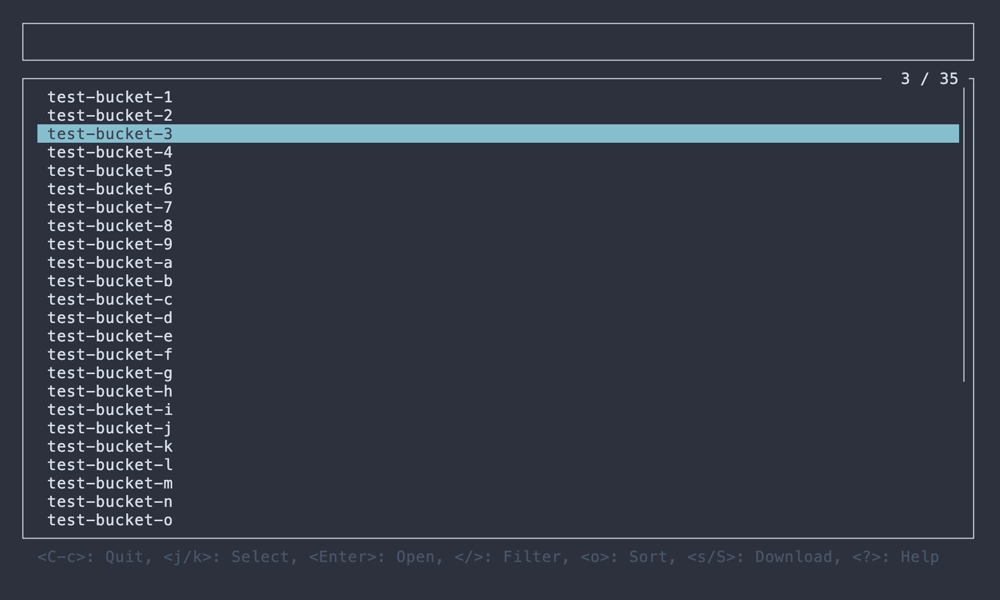

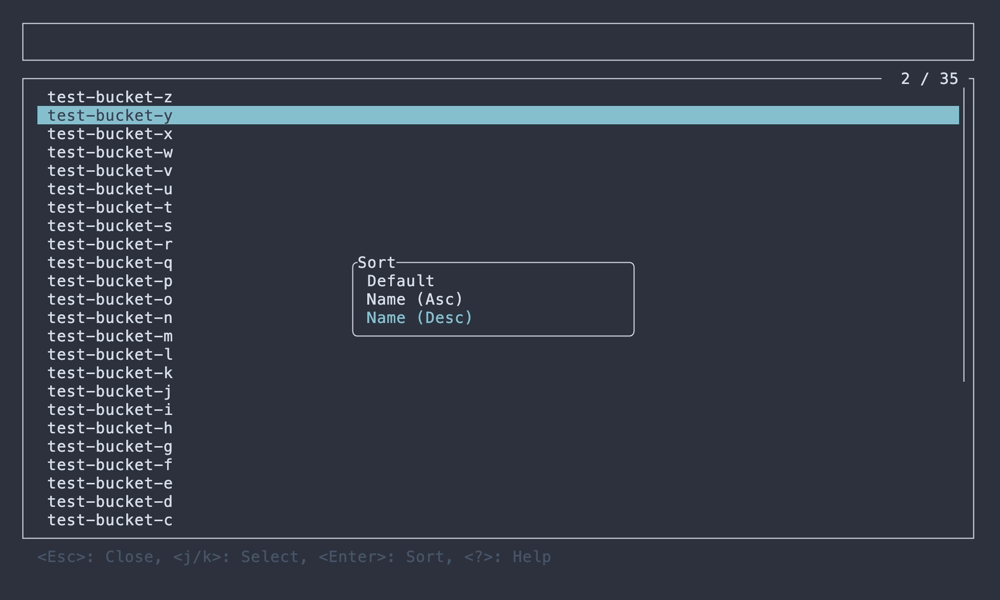
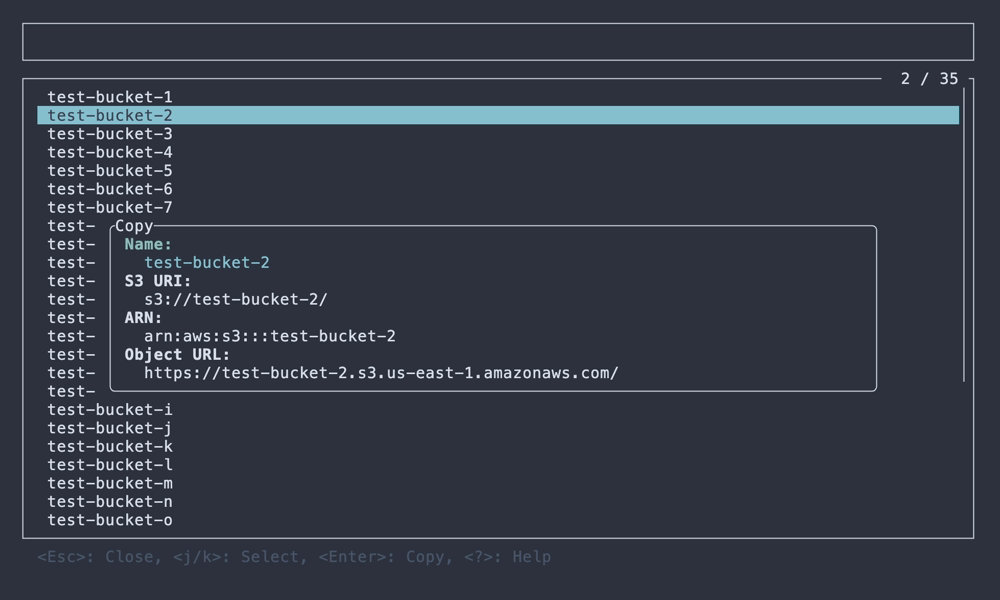
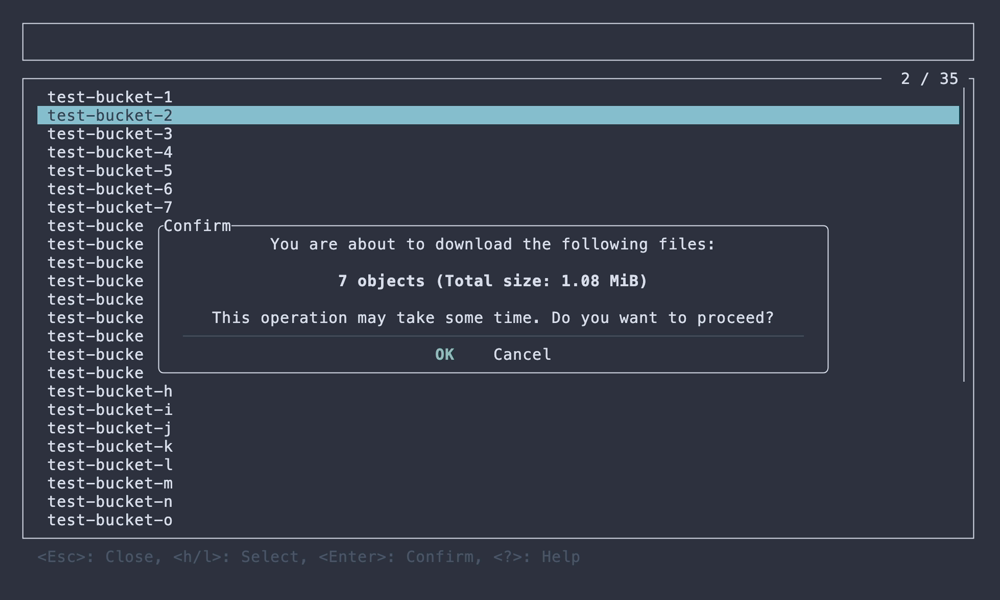
Object List
- Show list of objects in a hierarchy
- Filter items by name
- Sort items by name, last modified and size
- Copy the resource name of the selected object to the clipboard
- Download object
- Download a single selected object
- Recursively download objects in the selected directories
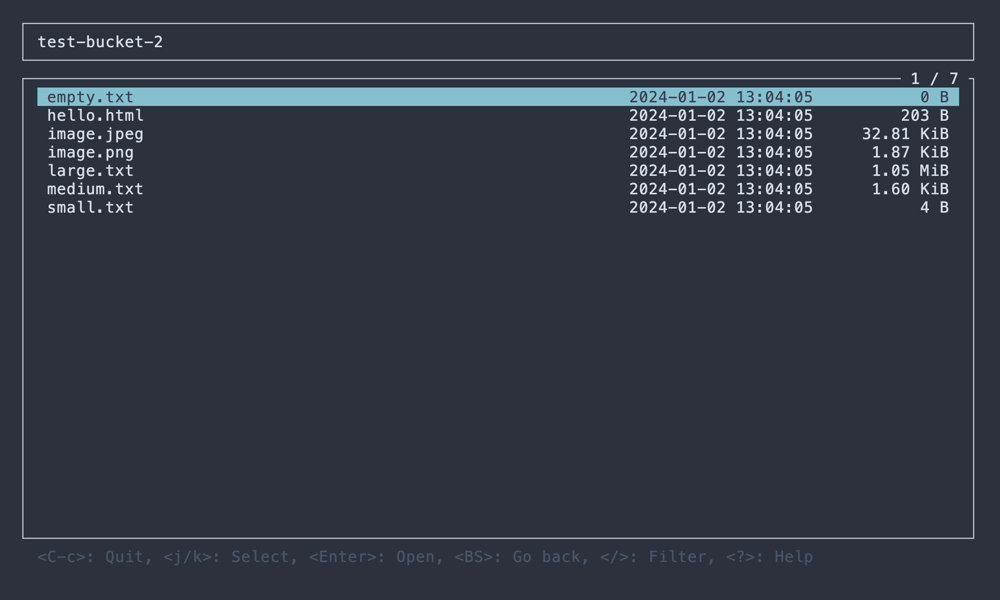
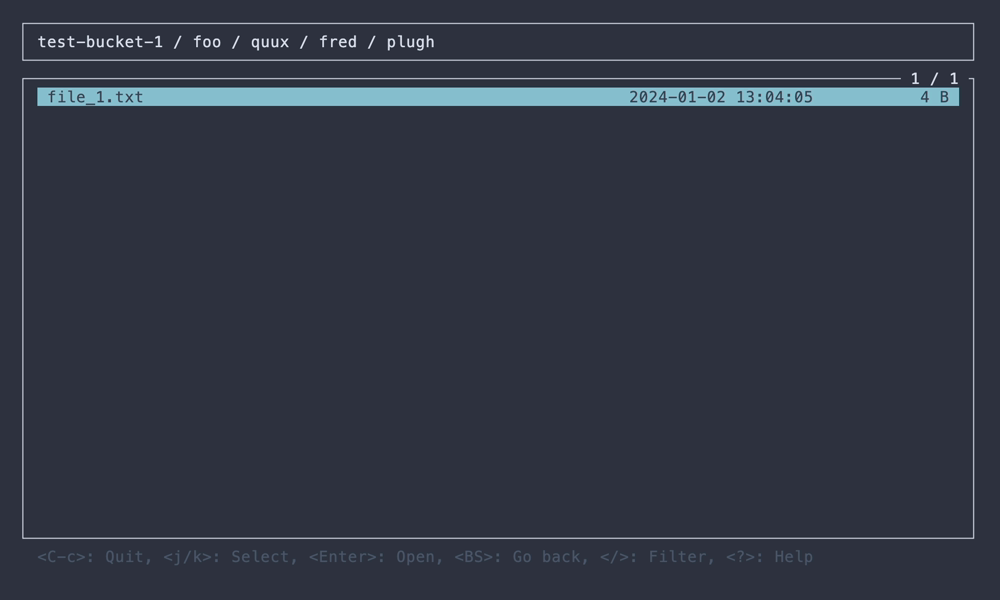
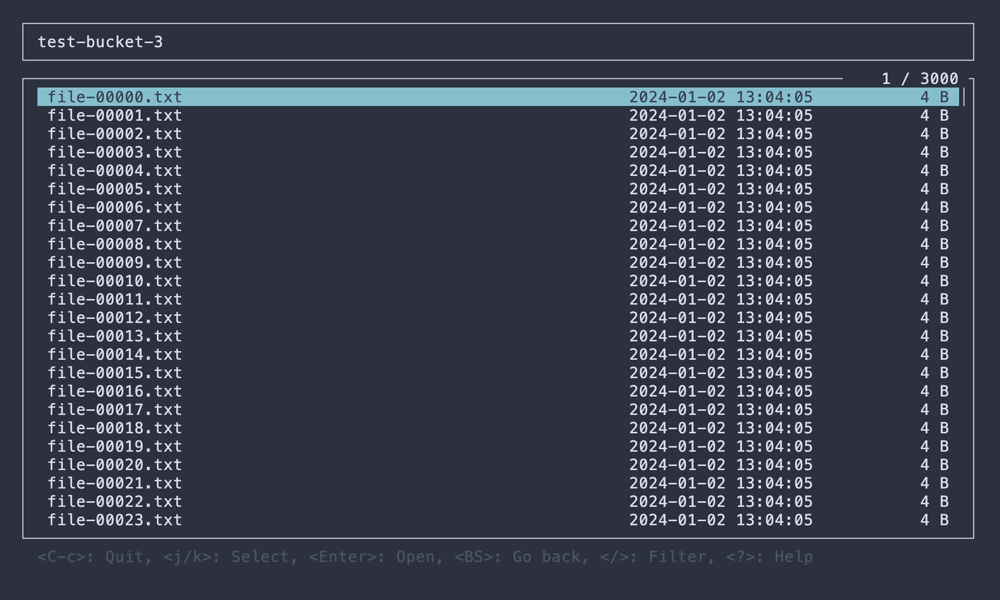

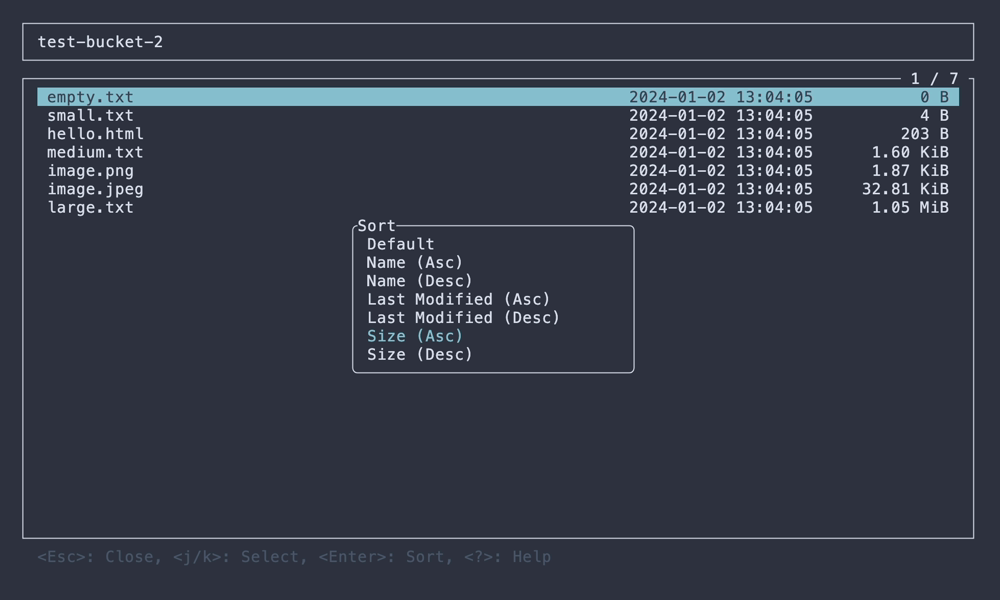
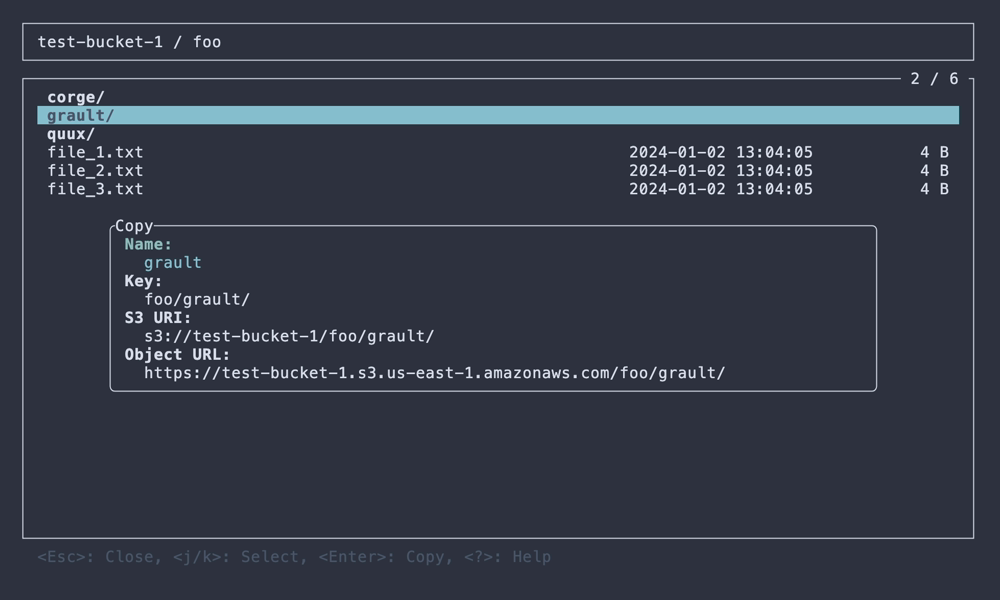
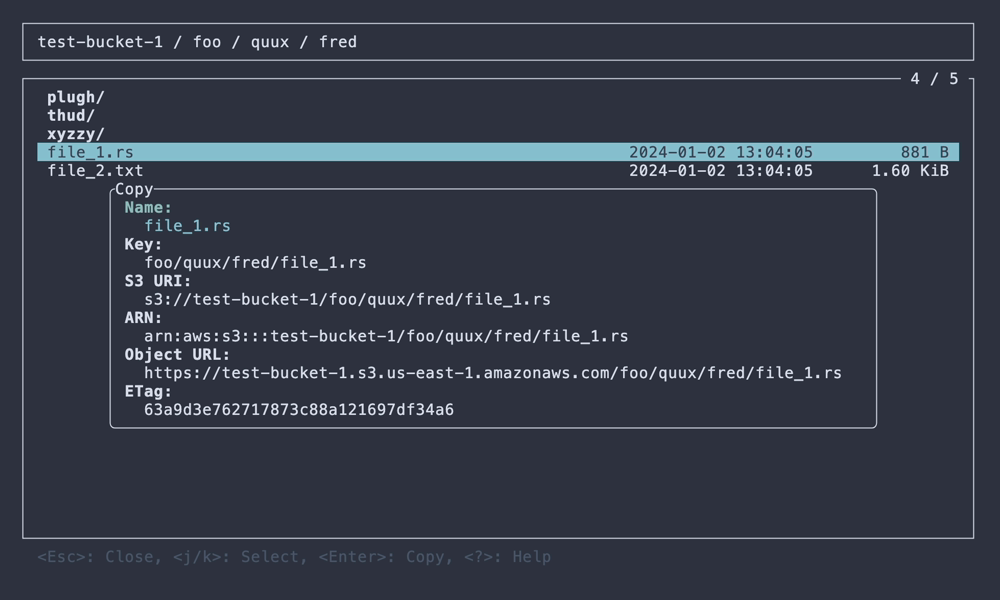
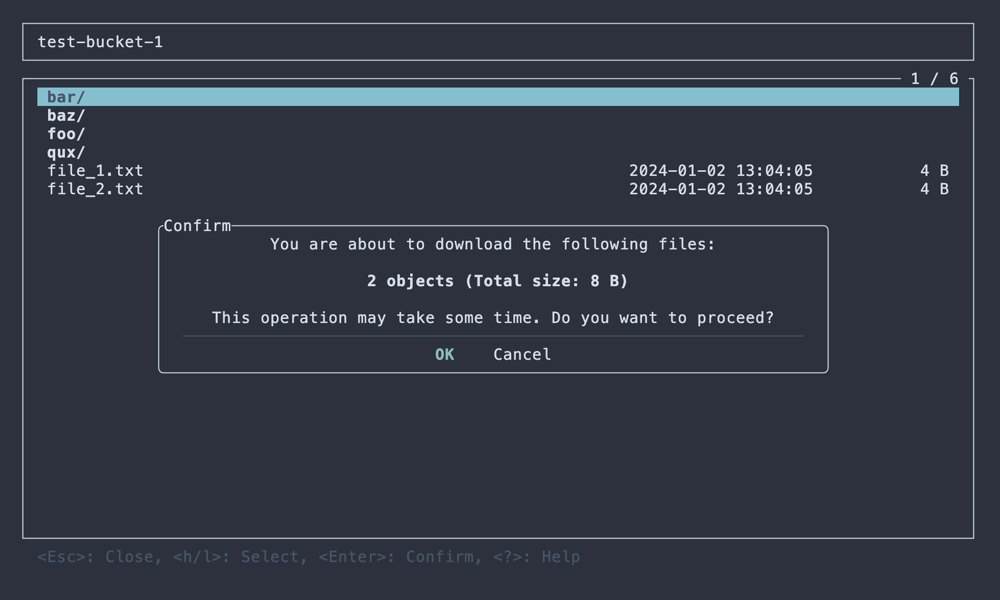
Object Detail
- Show object details
- Copy the resource name of the selected object to the clipboard
- Download object
- Download a single selected object
- Preview object
- Preview a single selected object
- Show object versions
- Each of the above operations can be performed for each version
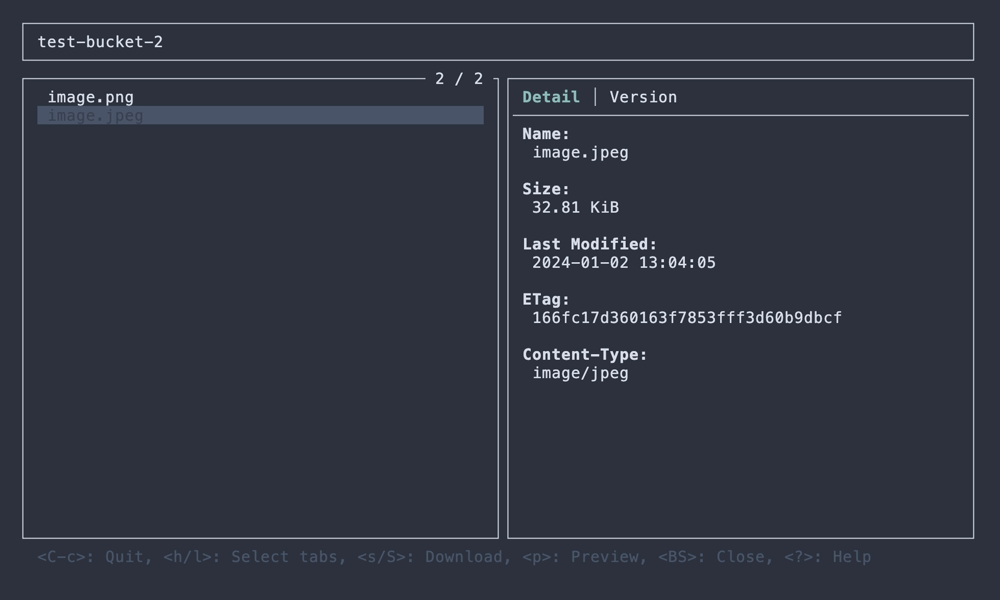
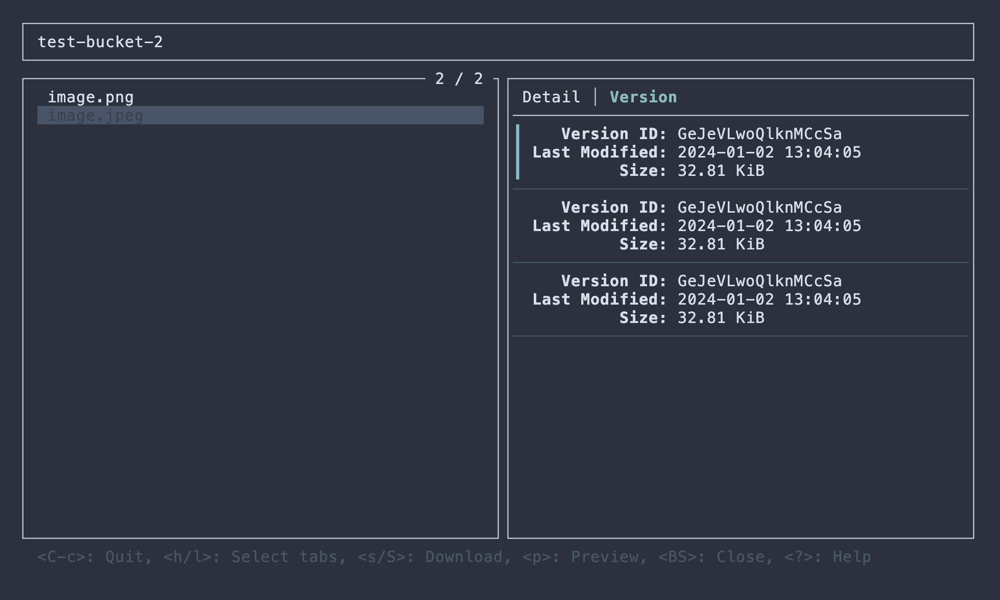
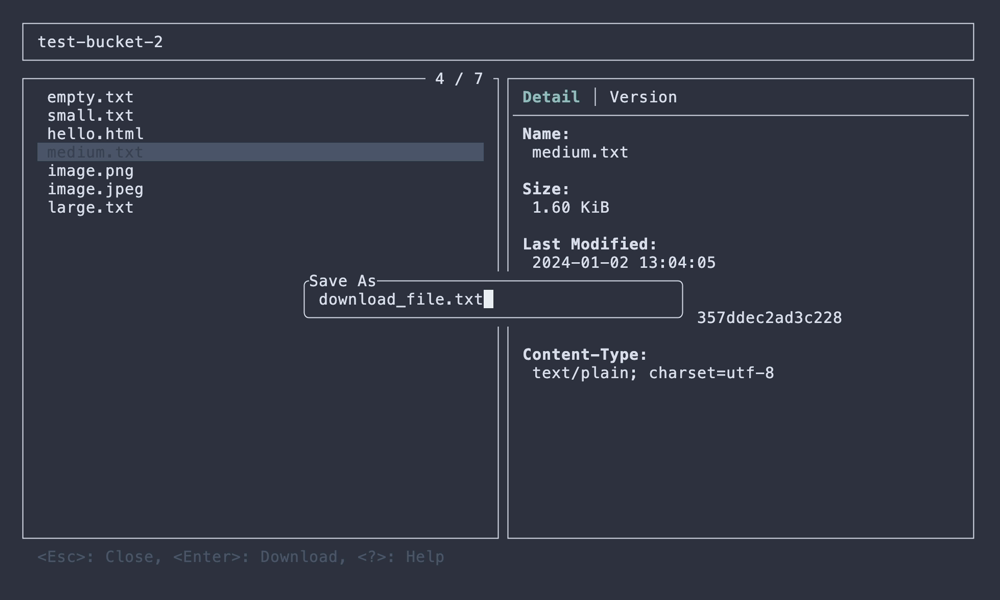
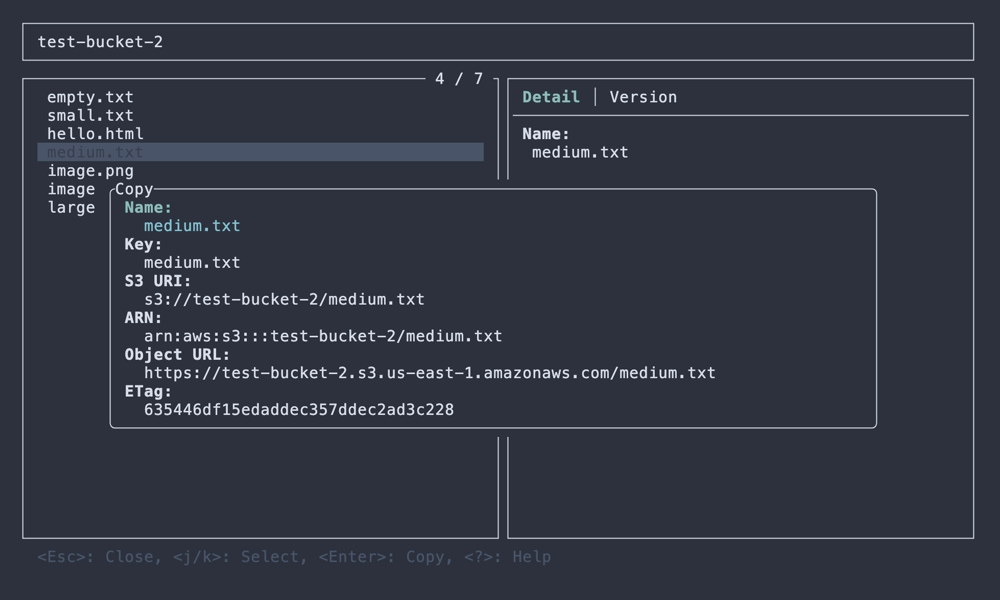
Object Preview
- Syntax highlighting
- It must be enabled in the config
- Image preview
- It must be enabled in the config
- Open with encoding
- Download object
- Download a single selected object
- Copy the content to clipboard
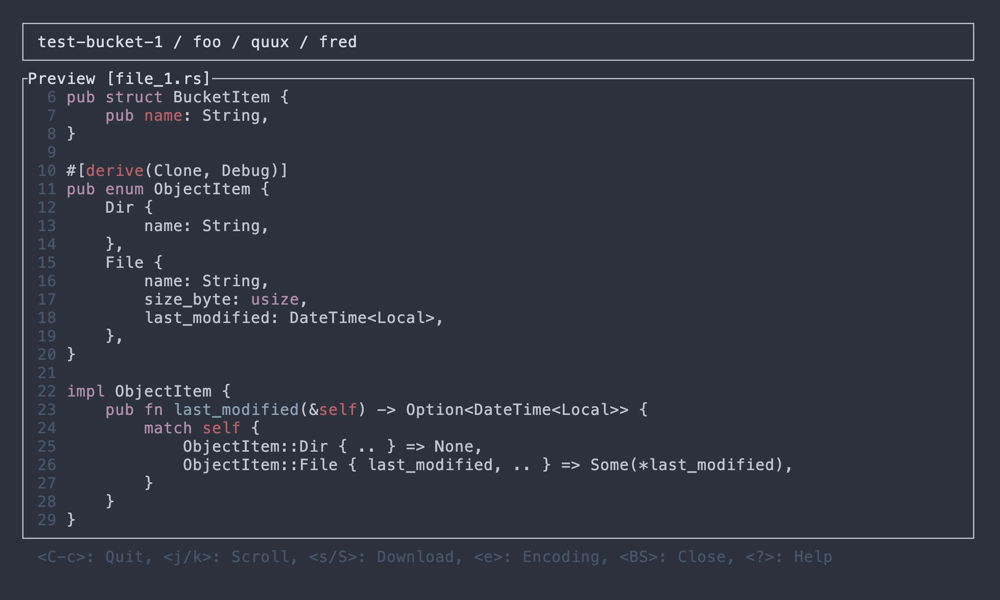
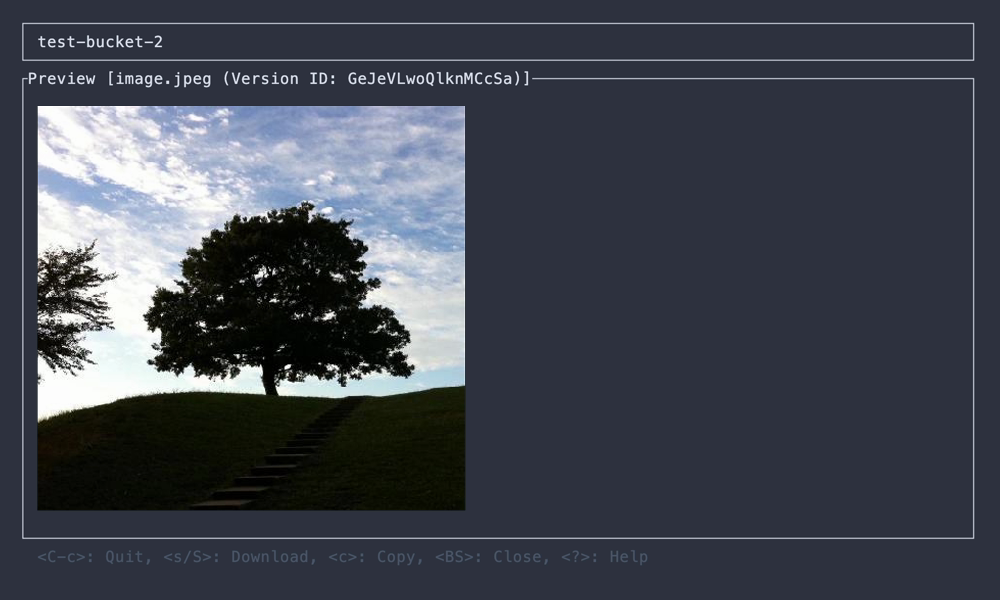
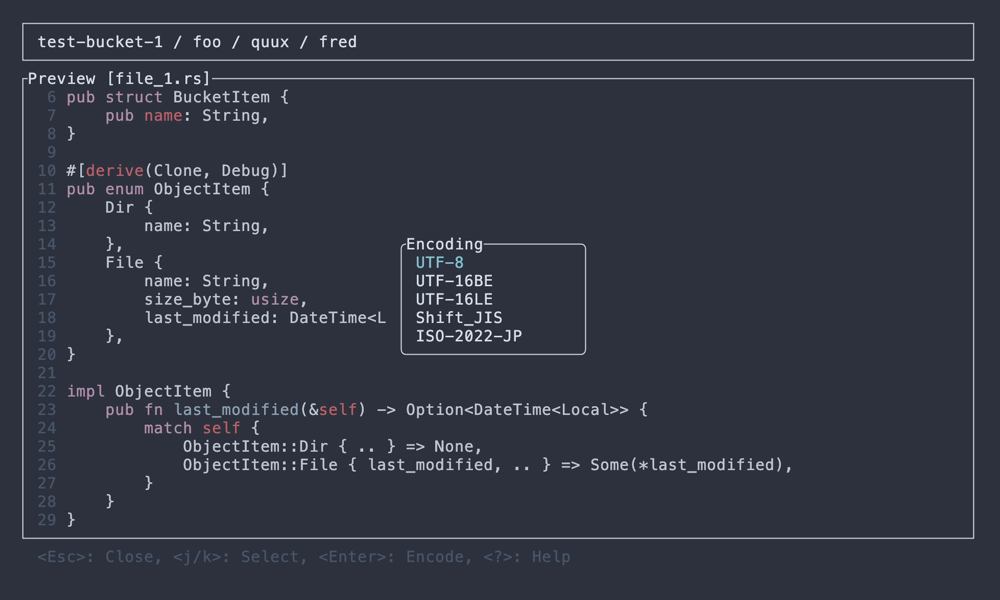
FAQ
Unable to connect to S3 or compatible service
- First, check if you can connect using the AWS CLI with the same settings.
- Are your AWS credentials configured properly?
- This includes checking
~/.aws/credentials, environment variables, or any credential provider chain used by the AWS CLI.
- This includes checking
- Are the necessary permissions set correctly?
- This includes IAM policies, roles, and bucket policies that allow operations like
s3:ListBucketors3:GetObject.
- This includes IAM policies, roles, and bucket policies that allow operations like
- If you're using an S3-compatible service:
- Is the
endpoint-urlset correctly? - Are you using the appropriate
path-styleaccess setting?
- Is the
- Are your AWS credentials configured properly?
- You may be able to find more details about the error by looking at the
$STU_ROOT_DIR/error.log.
Can't preview images
- Set
preview.image = truein config.toml. - Images are displayed using Sixel, iTerm2 Inline Images Protocol, and kitty Terminal graphics protocol. This feature will not work if you are using a terminal emulator that does not support any of these protocols.
I don't like Vim bindings, what should I do?
You can change the key bindings to your liking.
See Custom Keybindings for details.